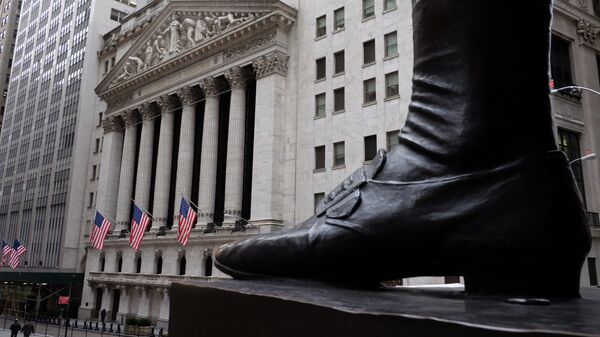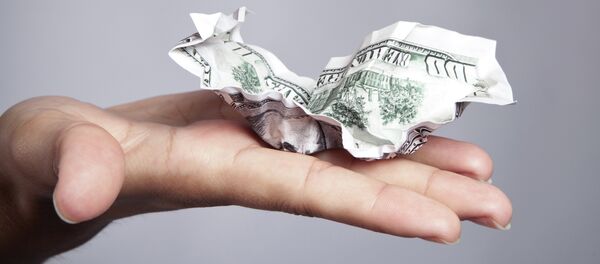Kristian Rouz — After President Obama allegedly hinted that a stronger dollar poses certain complications for the US economy against the background of higher political risks in Greece and elsewhere, the greenback lost ground, having rolled back from its recent multi-year peaks. Wall Street ended Monday's trading in the red as well, with the Dow retreating into negative territory for this year, even though the president denied he had made his now infamous dollar remarks. The losses in the currency and stock markets look even more dramatic, given that recent US jobless data surpassed expectations and the real economy is gaining momentum.
Dollar Diving on Obama Report Signals Currency-Strength Concern http://t.co/qhgBREC32f pic.twitter.com/JTNhpG3qDQ
— Francine Lacqua (@flacqua) 9 июня 2015
Nonetheless, President Obama's remarks have had some positive effect by staving off the speculative build-up in the US financials, putting them more in line with the pace of expansion in the real economy. Currently, the correlation between the financial and non-financial sectors of the world's biggest economy looks much healthier than just a couple weeks ago.
On Wall Street, the technology sector echoed these losses. Monday's trading showcased a third consecutive session of losses, with the Dow Jones Industrial Average even retreating to its pre-January levels.
The S&P 500 Index shed 0.65%, ending the trading day at 2,079.38 points, and is now 2% below its most recent high, posted on 21 May. The Index is also nearing its pre-2015 readings, and chances are high it is going to follow the Dow's trajectory.
The DJIA shed 0.42%, ending the trading day at 17,766.55 points. The Nasdaq Composite fell 0.92% and closed at 5,021.63. Overnight trading in US stock futures has been bearish as well, hinting that the sell-off might well continue into the following day.
Fixed-income is another story. With the next US Fed meeting imminent, yield on 10-year Treasury papers is on the rise. On Monday, the yield rose to 2.38% compared to the last two months' average of 1.86%. A higher yield naturally spurs demand for US government debt, and soon we might see investors leaving stocks in favor of fixed income. Market volatility, however, is rising as the bonds appreciate, and many market participants might feel dislocated as the US markets are at this point combining contradictory trends.
It's unclear which one will ultimately prevail.
To add to this uncertainty, last Friday some media reported a French official citing President Obama as saying the now-strong dollar is a concern for the economy amidst higher political risks elsewhere in the world. Despite the President later claiming ‘I did not say that', markets moved in reaction. The greenback slid 0.3% to $1.1321 against the euro on Tuesday, extending the 1.6% losses of the previous session. The yen appreciated 0.9% to 124.72 per dollar, dragging most Asian markets into the red on Tuesday.
The dollar has been the world's second best performer this past year after the Swiss franc, rising as much as 4.2% against the basket of first-world currencies. The dollar rally has been acknowledged as a concern by the Fed, which according to its latest meeting's minutes said that the negative consequences of a stronger greenback with regard to the US exports would be "larger and longer-lasting than previously anticipated."
In Washington, Fed Governor Lael Brainard said last week that a stronger dollar would impair US growth and probably cause delays in the Fed's return to normality in monetary policy (i.e. the rise of borrowing costs).
Overall, cheaper US stocks and a weaker dollar are weirdly among the positive developments in the US economy now. Recent macro data surpassed previous forecasts, indicating the US economy is poised for solid growth in Q2, so the consolidation in stocks is laying foundation for future gains. With more positive news arriving from the real economy, US financials are likely to pick up, however, the timing of the Fed's policy measures are now seen as a far more important issue.




